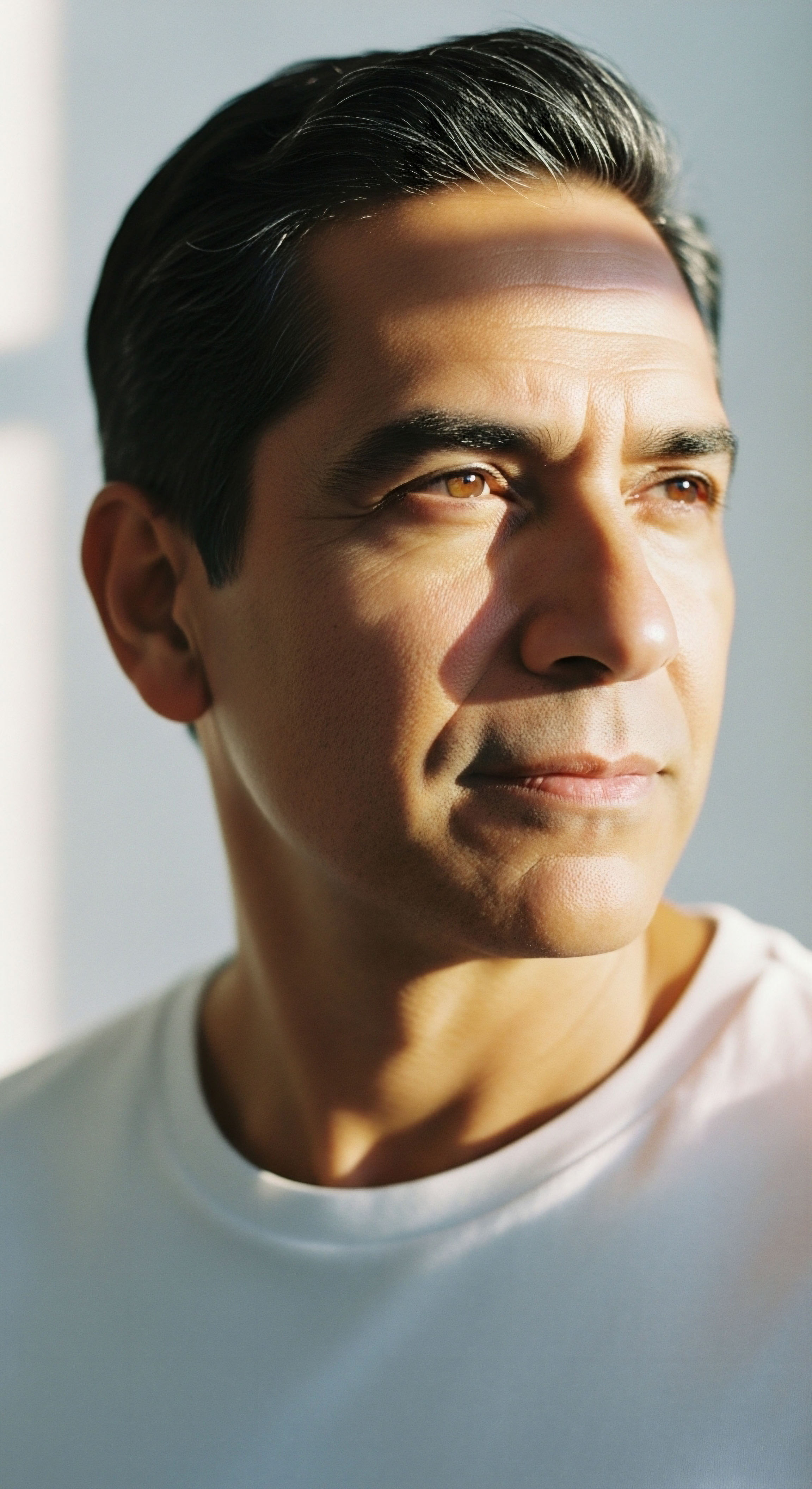

Your Body Is a Clock Not a Calorie Counter
You have been taught to view your body as a simple machine of inputs and outputs. The dominant narrative revolves around calories in, calories out; a brute-force accounting system that governs physical change. This model is incomplete. Your biology operates on a far more sophisticated principle. It runs on time.
Inside you is a silent, invisible metronome, a network of circadian pacemakers that dictates the function of every cell, every tissue, and every organ system. This is the master program coordinating your body’s intricate chemistry.
Aligning your physical efforts with this internal tempo is the difference between generic effort and precision-engineered results. The question of ‘what’ you do in your fitness regimen is only half the equation. The other, more decisive, variable is ‘when’ you do it.
The timing of physical exertion sends a powerful signal to your endocrine system, determining the hormonal cascade that follows. A workout performed at one time of day elicits a fundamentally different metabolic and anabolic response than the identical workout performed hours later. Your body is primed for specific activities at specific moments.
Engaging with this internal rhythm moves your fitness from a guessing game to a form of biological architecture. You begin to work with your body’s innate operating system, scheduling the right commands at the moments of highest receptivity. This is about accessing a new layer of efficiency.
It is the calibration of your external actions with your internal environment to create a synergy that magnifies outcomes. Your physiology is already running on a schedule. The mission is to get your training on the same timeline.


Calibrating the Endocrine Orchestra
The human body is governed by a precise 24-hour cycle known as the circadian rhythm. This internal clock, centered in the brain’s suprachiasmatic nucleus (SCN), directs the release of hormones that regulate energy, metabolism, and recovery. Timing your fitness is the act of strategically placing a physical stimulus ∞ your workout ∞ into this hormonal stream to produce a specific, desired effect. It is a dialogue with your DNA, using exercise as the language.
Understanding the key hormonal players and their daily fluctuations is the foundation of this practice. Two of the most influential hormones in this context are cortisol and testosterone, along with growth hormone and insulin. Their levels are not static; they ebb and flow with the light-dark cycle, creating distinct windows of opportunity for performance and adaptation.

The Morning Apex for Metabolic Recalibration
Upon waking, your body experiences a natural cortisol peak. Cortisol, often termed the stress hormone, is a catabolic agent, meaning it breaks down molecules for energy. When channeled correctly, this morning surge becomes a powerful tool for body composition. An early workout utilizes this elevated cortisol to mobilize fatty acids, making stored fat more available as a fuel source.
Concurrently, insulin sensitivity is typically higher in the morning, meaning your muscle cells are more receptive to taking up glucose from the bloodstream.
A session conducted during this period sends a clear signal ∞ access stored energy and prime the system for nutrient absorption post-workout. This makes the morning a strategic window for individuals whose primary goal is fat loss and metabolic regulation.
A University of Chicago study confirmed that hormonal and metabolic responses to exercise are profoundly dependent on the time of day it is performed.

The Afternoon Power Window for Strength and Performance
As the day progresses, the hormonal landscape shifts. By late afternoon, core body temperature reaches its daily peak. This physiological warming enhances muscle elasticity, nerve conduction velocity, and enzymatic activity. The result is a state of peak physical readiness. Your capacity for strength, power, and speed is at its highest. Reaction times are faster, and the risk of injury is lower.
Hormonally, the ratio of testosterone to cortisol tends to be more favorable for anabolism (muscle building) in the afternoon and evening. While morning cortisol is high, the afternoon provides a different endocrine profile, one that supports intense physical output and the subsequent protein synthesis required for muscle growth. Studies have also noted that evening exercise can produce substantial increases in cortisol and thyrotropin, hormones critical for energy metabolism.

A Framework for Timed Fitness
The application of this knowledge is a matter of aligning your primary fitness objective with the corresponding biological window. This is a system of strategic optimization. The following provides a blueprint for structuring your training according to your goals.
- Objective ∞ Fat Loss & Metabolic Health. The ideal training window is early morning (6-8 AM). Performing moderate-intensity fasted cardio or resistance training during this time leverages the natural cortisol spike to enhance fat mobilization. The heightened insulin sensitivity improves the body’s handling of post-workout nutrition.
- Objective ∞ Peak Strength & Muscle Hypertrophy. The optimal training window is late afternoon (4-6 PM). Your body’s core temperature and nervous system are primed for maximal force production. The hormonal environment is geared toward anabolism, supporting the intense effort required to stimulate muscle growth and the recovery process that follows.
- Objective ∞ Skill Acquisition & Performance. For activities requiring high levels of coordination, speed, and reaction time, the late afternoon window is also superior. The combination of elevated body temperature and optimized neuromuscular function creates the ideal conditions for athletic practice and competition.
- Objective ∞ Circadian Entrainment. Exercise itself is a powerful zeitgeber, or external cue, that helps set the body’s internal clocks. Consistent training at the same time each day, whether morning or afternoon, reinforces a stable circadian rhythm, which improves sleep quality, energy levels, and overall health. For individuals with disrupted sleep patterns, a morning workout can help anchor the start of their biological day, while an evening session should be timed carefully to avoid interfering with sleep onset.
This methodology is about intelligent application of effort. It requires a shift in perspective, viewing your workout not as a task to be completed, but as a precise instrument to be applied at the right moment. By synchronizing your training with your body’s innate rhythms, you begin to command a more potent physiological response, turning effort into tangible, architectural change.


The Moment the Signal Becomes the System
The transition to timed fitness begins with a simple act of awareness. It starts the moment you recognize that your energy, focus, and physical capacity are not random variables but predictable patterns. You notice the midafternoon slump is a recurring event. You feel a surge of alertness in the morning. These are the faint signals of your internal clockwork. The decision to act on this information is the first step toward conscious self-regulation.
You implement this protocol when your current approach yields diminishing returns. When you have optimized your nutrition and training program, yet progress has stalled, timing becomes the next logical frontier. It is the variable that can amplify the effects of everything else you are already doing.
The initial phase is one of experimentation and observation. You choose a window based on your primary goal ∞ morning for metabolic efficiency, afternoon for peak power ∞ and commit to it for several weeks. The body requires consistency to adapt its rhythms.

The Unfolding of the Adaptation
The first tangible results appear within two to four weeks. They are subtle at first. If you’ve shifted to morning workouts, you may notice a more stable energy level throughout the day, without the sharp peaks and troughs. Your appetite may feel more regulated.
If you’ve moved to afternoon sessions, the initial feedback is in your performance metrics. You may find you can complete an extra repetition, add a small amount of weight to the bar, or sustain a higher intensity for longer. The feeling is one of increased capacity.
After six to eight weeks, the adaptations become more pronounced. The body’s circadian rhythm begins to anticipate the scheduled workout. You will start to feel naturally energized and primed for activity as your training time approaches. For morning trainees, this might manifest as waking up more easily, feeling alert and ready for movement.
For afternoon trainees, this is the “second wind” that coincides with their gym session. This is the point where the external schedule has successfully entrained the internal clock. The signal has become part of the system.

The Long Term Transformation
Over months, the cumulative effects sculpt a more profound transformation. The body composition changes become visible. The strength gains become consistent. Beyond the physical, the benefits extend to cognitive function and mood. A well-regulated circadian rhythm, reinforced by timed exercise, is foundational to high-quality sleep.
This improved rest becomes the engine for better recovery, sharper mental acuity, and a more resilient emotional state. You are no longer just exercising. You are actively managing your biological state, using timed physical stress as a daily recalibration of your entire hormonal and neurological architecture.

You Are the Architect of Your Prime
The architecture of your vitality is not a static blueprint; it is a dynamic system responsive to intelligent inputs. Understanding the chronobiology of your own body grants you access to a new level of control, a new set of levers for sculpting your physical and mental state.
This knowledge transforms the act of exercise from a blunt instrument into a precision tool for biological engineering. You are the operator of a highly advanced system. The instruction manual has always been inside you, written in the language of hormones and time. The work is learning to read it.

Glossary

endocrine system

suprachiasmatic nucleus

circadian rhythm

metabolic health

timed exercise




